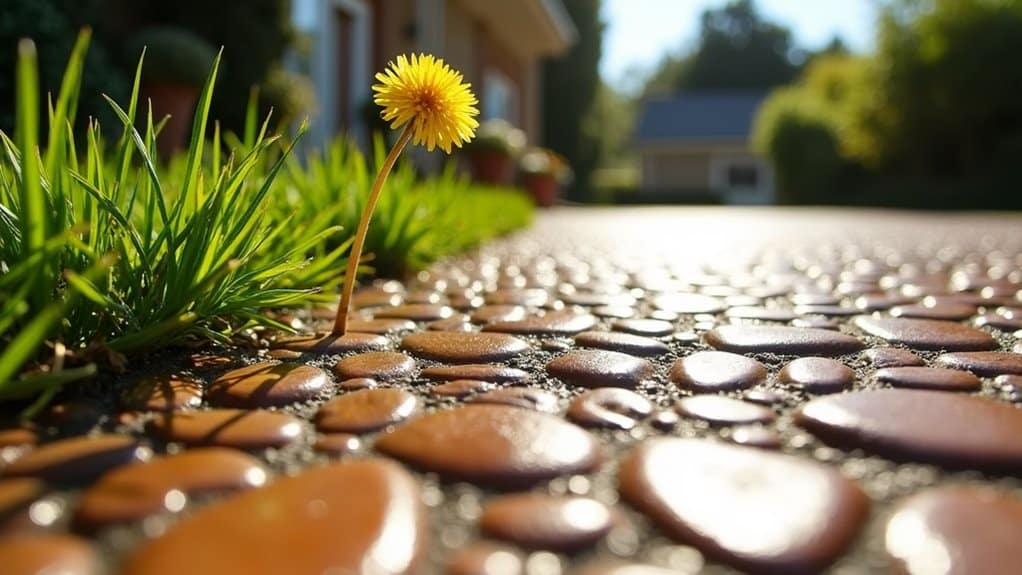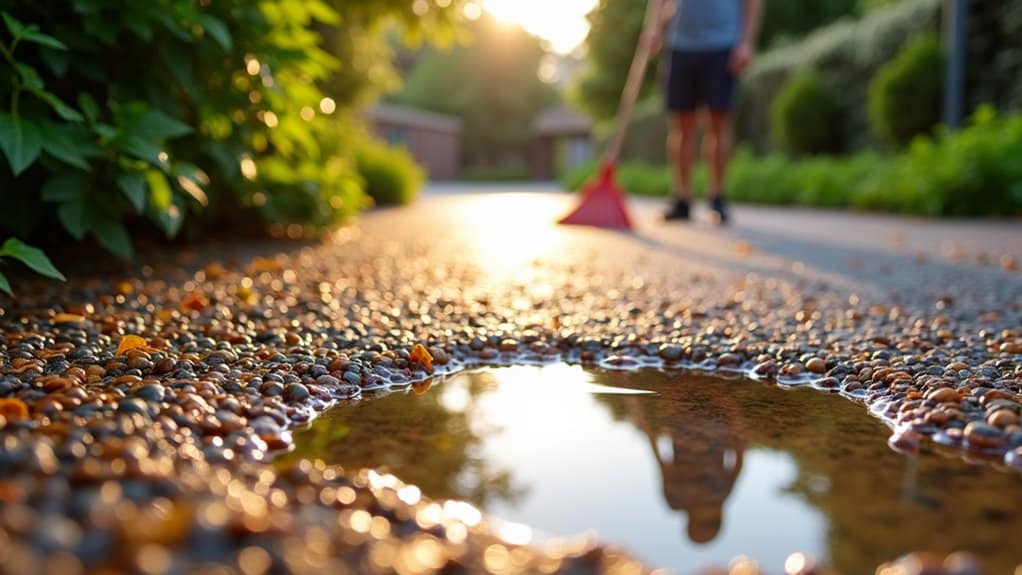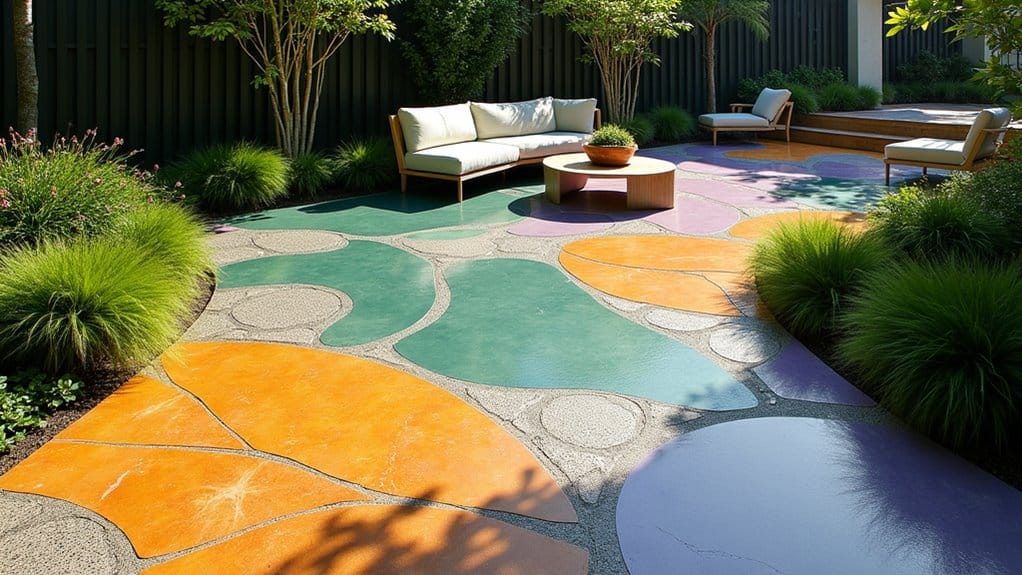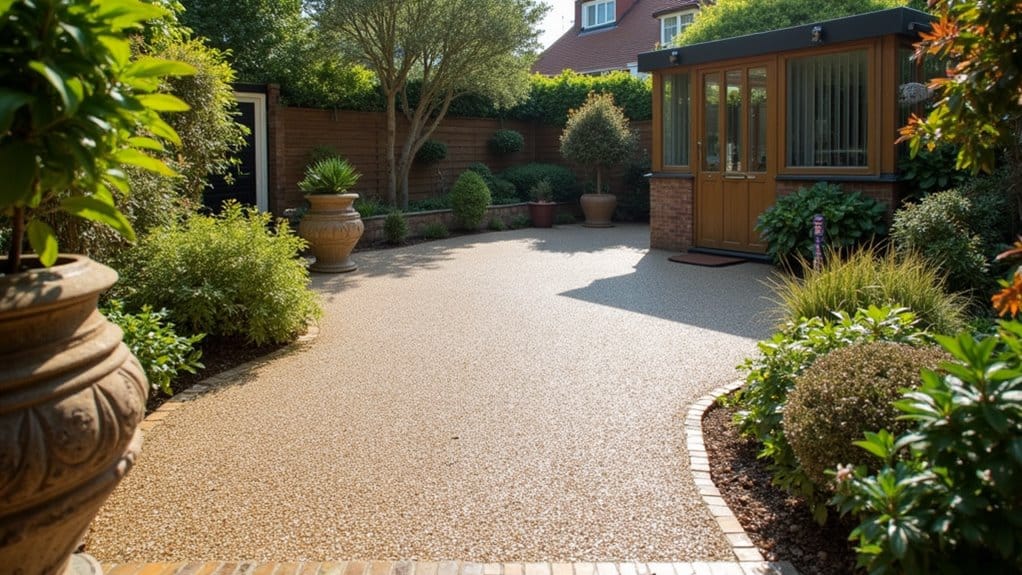Resin bound driveways and paths aren't as costly as you might think. Whilst the upfront costs are higher than traditional paving, you're paying for quality materials and proper installation that will last for years. Forget the myth about weeds – the tightly-packed stone mix actually prevents them from taking root, meaning less garden maintenance for you. These surfaces also come in a fantastic range of colours and finishes to match your property, from classic earth tones to modern greys. They're slip-resistant too, making them practical for British weather. When you consider the minimal upkeep and lasting performance, resin bound surfaces offer solid value for money and kerb appeal.
Key Takeaways
Common Misconceptions About Resin Bound Installations: The Truth
- Installation Over Existing Surfaces: Don't assume resin works on any surface. Just like you wouldn't build a house on shaky foundations, your existing base needs proper checking. A sound concrete or tarmac base is essential.
- Professional Installation Matters: Whilst DIY might save a few quid, it's penny-wise and pound-foolish. Professional installers understand crucial details like correct mixing ratios and proper depth – things that make the difference between a driveway lasting 5 years versus 15.
- Weather is Critical: The British weather plays a massive role. You wouldn't paint your fence in the rain, and similarly, resin needs the right conditions. Installation during rainfall or temperatures below 5°C can ruin the finish.
- Regular Care Required: Think of it like a car – low maintenance doesn't mean no maintenance. A quick pressure wash twice yearly and occasional sweep keeps your resin surface looking top-notch and prevents moss build-up.
- Quality Matters: Not all resin systems are created equal. Cheaper options might seem attractive, but premium UV-stable resins and properly graded aggregates ensure your driveway won't yellow or break down after a few harsh winters.
Higher Initial Cost Explained
The Higher Cost of Resin Bound Surfacing
Several key factors contribute to the higher upfront cost of resin bound installations. The materials alone – resin and aggregate – typically cost £40 to £70 per square metre. Premium products like Daltex UVR Plus Resin, whilst more expensive, offer better UV resistance and longevity. Additionally, using larger aggregates can enhance drainage but may also increase material costs.
Base preparation forms a substantial part of the cost, ranging from £30 to £50 per square metre. Poor existing surfaces might need extensive repairs, pushing these costs even higher.
Labour makes up a significant portion, usually £50 to £70 per square metre, varying by region and job complexity. Professional installation is crucial for durability and performance, typically accounting for 30% to 50% of total costs. Additionally, the permeable design of resin bound driveways contributes to their overall value by reducing flooding risks and enhancing drainage.
Location and customisation also affect pricing. London and other major cities command higher labour rates than rural areas, whilst bespoke designs require additional materials and time. A standard driveway in the Southeast might cost more than the same installation in the North of England.
Understanding these elements explains why resin bound surfaces require a larger initial investment compared to traditional paving options.
Versatility of Resin Applications
Resin coatings work brilliantly over most existing surfaces, from concrete to timber, saving you the hassle and cost of ripping out old flooring. Common applications include garage floors, driveways and industrial spaces. The material bonds well with properly prepared surfaces, creating a tough, smart-looking finish that's ideal for both domestic and commercial use. It's a practical choice that sorts out multiple issues in one go – whether you need chemical resistance in a workshop or a sleek finish in a showroom. Additionally, the exceptional durability of resin bound products ensures they can withstand heavy foot traffic and extreme weather conditions, making them a long-lasting option for various environments.
Existing Surface Compatibility
Checking Your Surface for Resin Bound Installation
Three essential checks before installing resin bound surfaces:
1. Surface Integrity
Sound base needed – repair any cracks with a cross-layered membrane. Fix damaged spots to 200mm depth using proper filling materials (such as Type 1 MOT stone), which is crucial for ensuring a solid sub-base.
2. Surface Cleanliness
Power wash thoroughly to remove all dirt, leaves and debris. Think of it like painting a wall – you wouldn't paint over dirt, and resin needs the same clean foundation for proper bonding.
3. Dry Conditions
Surface must be bone dry before application. Just as oil and water don't mix, moisture will prevent proper resin bonding and compromise your installation. A proper surface assessment saves time and money whilst ensuring a lasting finish.
If in doubt, consult a specialist to evaluate your existing surface.
Application Over Various Materials
Various Base Materials for Resin Bound Systems
Resin bound surfacing can be installed over several materials once you've checked your surface is suitable. The system works effectively on concrete, asphalt, tarmac, and existing paving slabs with proper preparation.
| Base Material | Considerations | Benefits |
|---|---|---|
| Concrete | Must be stable and level | Provides lasting durability |
| Asphalt | Needs proper drainage | Handles ground movement well |
| Tarmac | Requires UV-stable finish | Quick to install |
The resin layer's thickness varies based on your chosen base and aggregate size. Before installation, ensure the base is:
- Clean and free from debris
- Properly compacted
- Repaired of any cracks or damage
You may need a primer for better adhesion, particularly on concrete surfaces. This versatile system reduces the need for extensive groundworks whilst creating an attractive, hard-wearing surface. Additionally, understanding the importance of knowledge about local regulations and surface materials can significantly enhance the installation process.
Remember: a well-prepared base is crucial for a successful installation that will last for years.
Minimal Demolition Required
Minimal demolition has become a cost-effective way to install resin bound systems over existing bases across the UK. The approach saves both time and money, but proper base assessment remains crucial for lasting results.
Three essential checks before proceeding:
- Base Condition: Check the existing surface for stability and drainage. Tarmac and concrete bases typically work better than block paving or slabs – much like how an old driveway might still be sound underneath despite surface wear.
- Subgrade Stabilisation: Ensure the ground beneath is properly prepared for drainage. Think of it as making sure your garden soil drains well before laying a new patio. Regular sweeping with a stiff broom helps maintain surface cleanliness and prevents dirt build-up before installation.
- Professional Assessment: Get an expert to check the site. It's like having a surveyor inspect a house – better to spot problems early than face expensive repairs later.
Skipping these checks risks surface failure and wasted investment. A solid foundation that works with existing drainage is vital for durability.
The key is thorough assessment balanced with careful preparation – this creates resin bound surfaces that last, whilst keeping disruption to a minimum.
Weed Growth Myths

Resin bound surfaces offer excellent defence against pesky weeds.
Whilst the surface is permeable, letting rainwater drain through naturally, its tightly-packed structure leaves little room for weeds to establish themselves. This permeability aids in water drainage, reducing the chances of seed germination. Regular inspections and hand-pulling of weeds are recommended to ensure effective weed control.
Think of it like a well-fitted patio – there are simply no gaps for unwanted plants to exploit.
This built-in weed resistance means you'll spend far less time on garden maintenance, keeping your outdoor space looking smart year-round.
Weed Resistance Explained
Weed Resistance in Resin Surfaces: The Facts
Common myths about weed growth in resin bound surfaces need clearing up. These surfaces actually offer strong resistance against unwanted plant growth, and understanding how they work helps explain why.
Three main factors prevent weed growth:
- Solid Bond: The resin mixture bonds completely with the base layer, blocking gaps where weeds might grow.
- Water Management: Though permeable, the surface doesn't hold standing water, which weeds need to establish themselves.
- Simple Upkeep: A quick brush and occasional weed treatment keeps the surface clear of any stubborn growth. Additionally, the permeable nature of the resin allows for effective drainage, preventing water accumulation that could encourage weed growth.
Whilst resin surfaces resist weeds well, they still need proper care. Poor installation or damage can create weak spots where weeds might take hold. Regular maintenance keeps the surface in top condition and weed-free.
For best results:
- Check regularly for surface damage
- Sweep away debris monthly
- Apply weed treatment when needed
- Fix any cracks promptly
A well-maintained resin surface should stay virtually weed-free, protecting both its appearance and function.
Permeability and Drainage
The link between permeability and drainage is crucial for resin bound surfaces, and it's worth tackling the common myth about weed growth head-on. Contrary to popular belief, permeable surfaces don't encourage weeds to flourish.
Resin bound systems are engineered with clever drainage in mind. Their porous structure lets rainwater filter through efficiently, preventing water from pooling on the surface. Think of it like a coffee filter – water passes through whilst keeping everything else firmly in place.
The tiny spaces between stone aggregates ensure quick water dispersal. Unlike solid surfaces where puddles form and create perfect conditions for weeds, resin bound installations channel water away swiftly. This reduces both flood risk and the likelihood of weeds taking hold. In fact, studies show that Resin Bound Surfacing allows 100% of rainfall to percolate into the ground, further enhancing its drainage capabilities.
The key to success lies in the permeable base beneath. When properly laid, resin bound surfaces handle water far better than traditional block paving.
They're brilliant for sustainable urban drainage systems (SUDS), helping replenish groundwater naturally whilst managing surface water. It's a practical choice that tackles both drainage and weed control effectively.
Color Preservation Techniques
Maintaining Colour in Resin Bound Surfaces
Essential techniques keep resin bound surfaces looking fresh and vibrant throughout their lifespan. Three key methods protect your investment:
- UV Protection: Choose polyurethane resin with kiln-dried aggregates to guard against sun damage and discolouration, much like a quality sun cream protects your skin. This ensures resistance to discoloration over time. Furthermore, using UV-stable polyurethane can enhance the longevity of the surface's colour.
- Basic Upkeep: Regular brushing and gentle pressure washing preserve the original finish. Think of it as you'd routine car washing – little and often works best.
- Stain Defence: Deal with oil spills promptly and protect against tyre marks during installation. A protective seal coat works like a tablecloth protecting your dining table.
For existing colour issues, targeted solutions work best. Bleach mixtures tackle green algae effectively, whilst fine glass grit refreshes dulled surfaces without causing damage.
Avoid boiling water at all costs – it's as harmful to resin as it would be to plastic.
Stick to these straightforward methods, and your resin bound surface should keep its colour for years.
Safety Features of Resin Surfaces

Resin-bound surfaces provide excellent safety features for British homeowners. The textured finish offers superior grip, particularly useful during our wet winters and occasional icy spells. Additionally, the durable structure of resin-bound systems typically allows them to last up to 25 years, ensuring long-term safety for users.
These surfaces prove especially practical for families with young children, older residents, and those who need extra stability when walking. The surface's permeable nature means rainwater drains away quickly, reducing puddles and ice patches common on traditional paving. Even during harsh frost cycles, the material maintains its structure without cracking or lifting – a frequent issue with standard concrete drives.
Unlike gravel driveways, resin surfaces have no loose stones to create trip hazards. The solid surface stays intact year-round, requiring only occasional jet washing to remove dirt and prevent moss growth. This minimal maintenance keeps the surface safe and slip-resistant throughout the seasons, contributing to its long-term safety benefits for homeowners.
Installation Timeline Realities
Installation Timeline for Resin-Bound Surfaces
Three key factors impact how long your resin-bound surface installation will take:
1. Weather Conditions: Installation works best between 5°C and 35°C.
British weather plays a crucial role – rain will halt work completely, whilst a summer heatwave means the resin sets faster, forcing quicker application.
During winter months, expect curing times of 48+ hours.
2. Site Prep: Getting the groundwork right is vital.
Your surface needs proper excavation, levelling and a solid base (typically compacted hardcore or concrete).
Most UK gardens need 1-2 days of prep work – more if dealing with poor drainage or uneven ground.
3. Installation Process: The base layer normally takes 1-2 days, with resin application requiring several days to a week.
Think of it like painting – rushing means poor results.
Summer installations cure within 6-12 hours, but winter jobs need up to 48 hours before you can walk on them. Additionally, proper installation can ensure the surface's longevity and reduce the need for future repairs.
Maintenance Requirements

Regular upkeep of your resin bound surface needn't be complex. A monthly sweep and gentle pressure wash will shift loose debris, whilst seasonal maintenance is vital – clear fallen leaves in autumn and snow in winter. These simple steps protect your surface from damage and keep it looking smart year-round. Additionally, performing regular inspections for cracks, chips, or discoloration can help extend the lifespan of your driveway. Regular sweeping every 1-2 weeks minimizes the need for deep cleaning and prevents moss growth.
Regular Cleaning Practices
Regular cleaning keeps resin-bound surfaces looking great and lasting longer. Follow these essential maintenance steps:
- Regular Sweeping and Hosing: Use a stiff brush to sweep away leaves and debris, followed by hosing to prevent build-up and staining. Perfect for weekly maintenance. Regular sweeping helps maintain the surface's original shine.
- Light Pressure Washing: Give your surface a thorough clean once or twice yearly with a pressure washer. Use a fan nozzle at 150 bar – enough to shift dirt without damaging the surface.
- Quick Spill Clean-up: Tackle spills straight away to prevent staining. For oil or grease, blot the area and clean with washing-up liquid and warm water.
Most resin driveways need just regular brushing and occasional hosing to stay in top shape.
Unlike traditional driveways, they don't need sealing as they're designed to let water drain through naturally.
Stick to these simple steps, and your resin surface will stay pristine for years to come.
Long-Term Care Tips
Maintaining Your Resin-Bound Surface
Essential long-term care keeps your resin-bound surface in top condition. Regular checks and proper seasonal maintenance will extend its lifespan considerably.
| Season | Maintenance Task | Notes |
|---|---|---|
| Autumn | Clear fallen leaves | Stops staining and surface wear |
| Winter | Apply suitable de-icing salt | Prevents ice damage |
| Spring | Deep clean and treat for weeds | Controls unwanted growth |
| Yearly | Check for cracks or damage | Spot problems early |
| Every Few Years | Reseal surface | Maintains UV protection and colour |
Avoid damage by spreading heavy loads evenly and keeping sharp items away from the surface. For repairs, use matching patches and blend edges carefully. Regular inspections can help identify issues early and prevent more significant problems later. Professional cleaning and inspection services are worth the investment – much like servicing your car. Regular maintenance now saves money on major repairs later.
Environmental Benefits
Environmental Benefits
Resin bound surfaces deliver substantial green benefits for sustainable urban development in the UK. This paving choice actively supports local biodiversity and reduces pollution in our communities.
- Permeability and Water Management: Resin bound surfaces drain naturally, cutting flood risks and stopping pollutants from contaminating local waterways. They meet UK Sustainable Urban Drainage Systems (SUDS) requirements, particularly vital given our wet climate. The permeability feature of resin-bound driveways also promotes groundwater replenishment, minimizing strain on drainage systems.
- Use of Recycled Materials: Many UK installers use recycled materials in their resin bound mixes, including crushed glass and plastic waste. For example, Oltco's Recycle Bound system uses the equivalent of 3,000 plastic straws per square metre, helping tackle Britain's plastic waste problem.
- Durability and Longevity: A well-installed resin bound surface lasts up to 20 years, reducing waste and the carbon footprint linked to manufacturing replacement materials. This longevity makes it a practical choice for UK driveways and public spaces.
Aesthetic Options Available

Resin bound surfaces offer numerous design choices to enhance any outdoor space whilst being environmentally friendly.
The colour range spans from natural earth tones to bold shades and metallic finishes, letting you mix and match to suit your taste. For added practicality, special features like glow-in-the-dark stones and reflective materials improve visibility at night. Additionally, the DALTEX collection features 48 unique gravel blends that allow for limitless designs.
Pattern options are vast – from simple geometric shapes to detailed designs. You might fancy classic squares and circles or opt for more elaborate patterns to create interest in your garden or driveway. Natural motifs work brilliantly for blending your surface with the surrounding landscape. Interestingly, the right choice of colour can significantly enhance curb appeal and potentially increase your property value.
Different textures and stone types serve both practical and aesthetic purposes. Whilst smooth finishes look smart on patios, textured surfaces provide essential grip for driveways and walkways.
The stone mix you choose affects both the look and durability of your surface. Whether you're redoing your driveway, garden path or patio, resin bound surfaces can be tailored to match your property's style.
Common Installation Mistakes
Common Installation Mistakes
Three key areas to watch when installing resin bound surfaces:
1. Base Preparation: A stable base of tarmac, asphalt or concrete is essential.
Never lay resin directly over existing paving – it'll crack with movement.
Use MOT Type 1 or crushed stone for your foundation, ensuring it's well-compacted with proper drainage to stop water pooling. Additionally, remember that proper base preparation is crucial for durability and performance.
2. Mixing Errors: Get your mixing ratios spot-on.
Poor mixing leaves surfaces either too loose (like a gravel path) or too rigid (prone to cracking).
Keep components dry and don't overmix – you'll end up with dust and patchy colours.
A forced action mixer gives the best results.
3. Installation Depth and Expansion Joints: Stick to correct depths – 18-20mm for vehicles, 15mm for footpaths.
Don't skip expansion joints; they're crucial for preventing cracks from temperature changes.
Mind the weather too – avoid laying in rain and let it cure properly before use.
Think of it like paint – you wouldn't walk on that before it's dry.
Frequently Asked Questions
Can I Install Resin on a Sloped Surface?
Yes, resin can be installed on sloped surfaces with proper planning. The key is getting the basics right: ensure your slope has a stable base, thorough preparation, and proper drainage. Common applications include driveways and garden pathways with gradients. Think of it like laying tiles – the surface needs to be sound and even, though the resin itself will follow the slope naturally. Standard practice suggests incorporating drainage channels or grids to handle water run-off effectively, especially important given the UK's wet climate.
How Does Resin Compare to Concrete in Terms of Flexibility?
Resin offers noticeably more flexibility than concrete, reducing the risk of cracks and breaks. This makes it particularly well-suited to British weather conditions and busy walkways, such as shop entrances or garden paths. Unlike concrete, which can crack during ground movement or frost, resin maintains its integrity whilst adapting to environmental changes.
Is Resin Bound Suitable for Driveways and Walkways?
Resin bound surfaces offer excellent water drainage, with up to 90% permeability – making them ideal for British weather. They're particularly well-suited for driveways and pathways, offering remarkable durability whilst requiring minimal upkeep. The surface stays stable through frost and rain, and maintains its smart appearance year-round.
What Types of Aggregates Are Used in Resin Bound Systems?
Stone aggregates used in resin bound systems typically include granite, quartz, marble and recycled glass. These materials get thoroughly mixed with resin at precise ratios to create robust, attractive surfaces perfect for British driveways, paths and patios. Granite offers excellent durability for high-traffic areas, whilst quartz provides an attractive sparkle, particularly suited to decorative garden features. The choice of aggregate directly impacts both the final look and performance of your surface.
Can I Change the Color of My Resin Surface Later?
Changing a resin surface colour is possible but rather complex. The process typically requires stripping the existing layer and applying new resin, which is both time-consuming and costly. For this reason, it's worth taking extra care when selecting your initial colour – much like choosing permanent wall tiles for your bathroom.
Conclusion
Straightforward facts about resin bound surfaces can save both your time and money. Research shows these installations routinely last 25 years when properly maintained – outlasting conventional block paving and concrete. Once you get past the myths about cost, upkeep and eco-friendliness, you'll see why more UK property owners are choosing this option. Whether for your driveway or patio, resin bound surfaces offer lasting value and smart kerb appeal.
